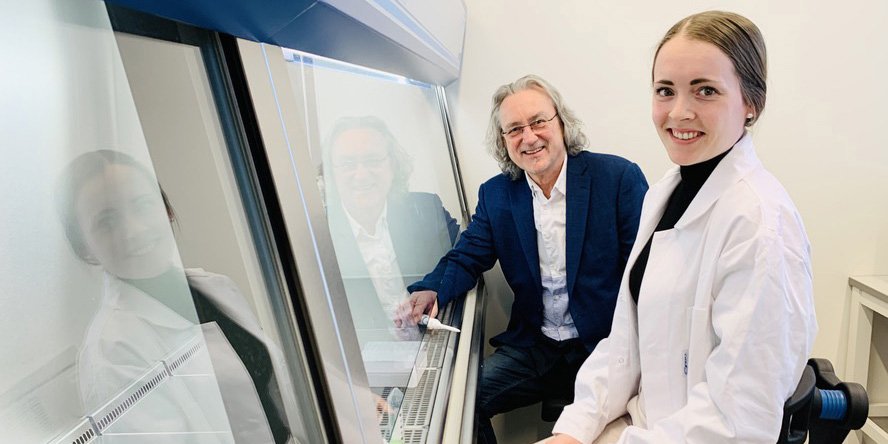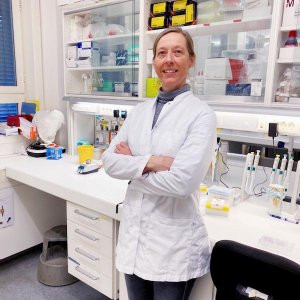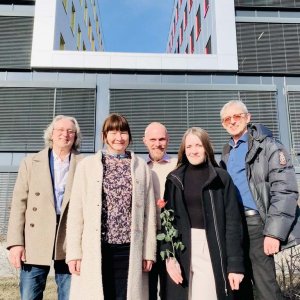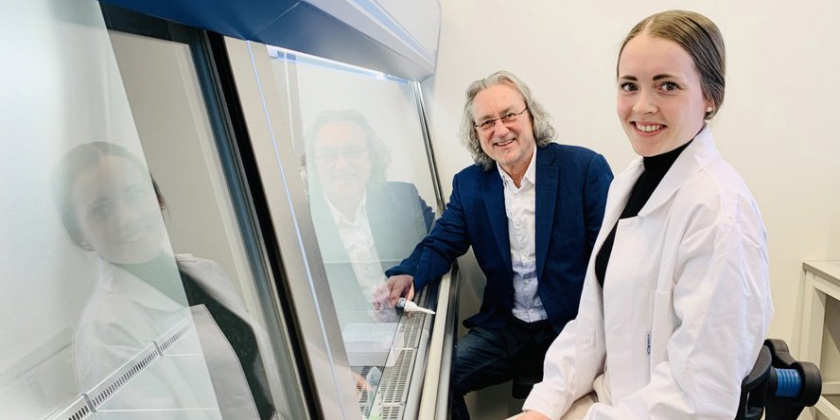A PhD on antibiotic resistance
 OCC
OCC
Rebekka Rolfsnes is doing her PhD with the start-up AdjuTec Pharma AS and the Department of Pharmacy at the University of Oslo (UiO). Together, they will look for solutions to antibiotic resistance.
Rebekka Rolfsnes has a Master’s in molecular biology and will be starting her PhD next month. The subject is antibiotic resistance, and more accurately she will study the mechanism of action of one of AdjuTec Pharma’s new compounds, called APC247, on resistant enzymes, bacteria, and off-target effects in human cells. The PhD project is a result of a collaboration between the industry and the university.
Read more about the industry PhD scheme at UiO’s web pages.
A hope to save the world
When asked why she wanted to work with AdjuTec, Rebekka Rolfsnes said:
“Working with a start-up in this field is a unique opportunity to be part of something big all the way from start.”
“Besides, the combination of pharmacy and microbiology is the most intriguing I know,” she added.
Rolfsnes will be writing three articles that will cast new light on the global health problem of antibiotic resistance.
“This is the subject that is closest to my heart because it is a global challenge and there is a hope to save the world. Although it is also a very scary issue,” Rolfsnes admitted.
Win-win relationship
Professor Hanne Cecilie Winther-Larsen at the Department of Pharmacy, UiO, is Rolfsnes’ main PhD supervisor.
“This PhD project will meet one of the largest challenges our society is currently facing, antimicrobial resistance, and we are happy to be a part of it. In the early phase of this project, there are many questions to answer and experiments to perform, which we find scientifically interesting,” said Winther-Larsen.

Professor Hanne Cecilie Winther-Larsen, in the lab at the Department of Pharmacy, UiO.
The Department of Pharmacy offers both competence and the infrastructure to support a successful outcome for the project. Professor Winther-Larsen had no doubt:
“The mutual relationship between the industry and the university creates a win-win situation.”
The slow pandemic
Antibiotics are important for treating infections but also for prophylactic use during major surgery, cancer therapy, and for patients vulnerable to infections, such as patients on immunosuppressive drugs and catheterized patients. But after many years of successful treatment of bacterial infections, there has been an alarming increase of infections that are resistant to even last-resort antibiotics.
Pål Rongved, founder, project leader, and CSO in AdjuTec, and professor at UiO, put it this way:
“Antibiotic resistance is the slow pandemic. It is a steadily increasing threat.”
Antibiotic resistance, or antimicrobial multidrug resistance, is due to decades of overuse of antibiotics in agriculture and human medicine, and with few antibiotic innovations. This creates all kinds of problems in hospitals, where the presence of bacteria is high.

The entire Adjutec Pharma team in front of Oslo Cancer Cluster Innovation Park. From the left: Pål Rongved, Bjørg Bolstad, Ragnar Hovland, Rebekka Rolfsnes and Bjørn Klem.
AdjuTec’s story
AdjuTec’s story started in 2009, when professor Pål Rongved and one of his PhD students at UiO, Alexander Åstrand, found a remarkable effect in their PhD project (which was a collaboration with The University Hospital of Northern Norway and the University of Tromsø).
The effect was this: A chemical compound that could inactivate bacterial resistance enzymes, thus preserving the effect of common antibiotics.
In 2019, Rongved established AdjuTec Pharma to commercialize his invention, which he called the ZinChel technology. The first drug candidate was called APC148 and targets one of two main resistance enzyme families, the metallo-beta-lactamases (MBLs). APC148 is the lead product of AdjuTec in preclinical development, planning for clinical trials in healthy volunteers next year.
AdjuTec has been heavily supported by the Norwegian Research Council (NRC) from the start, and with private investors also on board, the company can now develop its pharmaceutical projects and hire the right people. The company was recently awarded financial support from the City of Oslo, an industry innovation project (IPN) from NRC as well as Eurostars to kick-start the new APC247 preclinical program.
A new drug candidate
During the summer of 2021, AdjuTec designed a new substance that works on a broader spectrum of bacteria compared to APC148. This next-generation compound is called APC247. It is based on a different technology that shows promise in inhibiting both the main resistance families, the prior mentioned MBLs and the serine-beta-lactamases (SBLs).

Both AdjuTec products will be administered intravenously to patients in combination with antibiotics. If successful, and with various regulatory fast tracks, AdjuTec expects that the new drug candidate can be ready for market in five years.
Read more about AdjuTec and their progress on their homepage.






